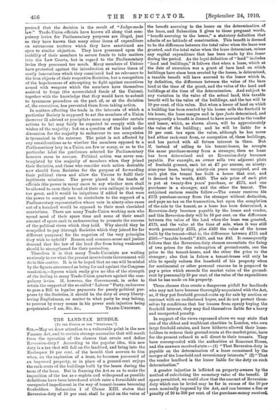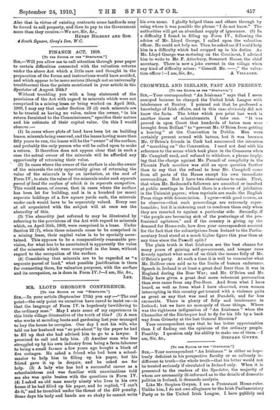TUE LAND-TAX MUDDLE.
[To ran EDITOR OP THE " SPECTATOR."]
SIR,—May we draw attention to a vulnerable point in the new Finance Act, and to certain strange anomalies that will result from the operation of the clauses that create and define Reversion-duty ? According to the popular idea, this new duty is a tax that will fall on the landlord, and bring into the Exchequer 10 per cent. of the benefit that accrues to him when, on the expiration of a lease, be becomes possessed of an improved property, or in place of a ground-rent enjoys the rack-rents of the buildings built by the lessee during the term of the lease. But in framing the Act so as to make the imposition of the tax as c ,mplete and widespread as possible definitions have been introduced which raise a formidable and unexpected impediment in the way of tenant-lessees becoming freeholders. Subsection 1 of Clause XIII. states that Reversion-duty of 10 per cent. shall be paid on the value of the benefit accruing to the lessor on the determination of the lease, and Subsection 2 gives to these pregnant words, " benefit accruing to the lessor," a statutory definition that admits of no latitude of construction. This benefit is deemed to be the difference between the total value when the lease was granted, and the total value when the lease determines, minus any capital expenditure that has been made by the lessor during the period. As the legal definition of "land" includes "land and buildings," it follows that when a lease, which at the date of execution was a grant of bare land on which buildings have since been erected by the lessee, is determined, a taxable benefit will have accrued to the lessor which is, by definition, the difference between the value of the bare land at the time of the grant, and the value of the land and buildings at the time of the determination. And subject to any variation in the value of the actual land, this taxable benefit will be the value of the buildings, and the tax will be 10 per cent. of this value. But when a lessor of land on which a building has been erected by his lessee sells the freehold to his lessee, the lease merges and is ipso facto determined, and consequently a benefit is deemed to have accrued to the vendor and lessor, which, as shown above, will be approximately the value of the building ; and he will be liable for a 10 per cent. tax upon the value, although he has never had either rack-rent from, or occupation of, these buildings, and has parted with all future interest in them. But if, instead of selling to his tenant-lessee, he accepts the same purchase-money from a stranger, then no lease has been determined and no Reversion-duty becomes payable. For example, an owner sells two adjacent plots of freehold ground, each let at £7 per annum, on ninety- nine-year lease, having ninety-six years unexpired, and on each plot the tenant has built a house that cost, and is deemed to be worth, £420. The sale price of each plot is put at twenty-five years' purchase, or £175, and one purchaser is a stranger, and the other the tenant. The subjoined curious results follow:—The owner receives his £175 purchase-money from the stranger without deduction, and pays no tax on the transaction, but upon the completion of the sale to the tenant, as a lease has been determined, a Reversion-duty becomes payable by the lessor and vendor, and this Reversion-duty will be 10 per cent. on the difference between the value of the land when the lease was granted, £175, and the value at the time of sale, when it was still worth presumably £175, plus £420 the value of the house built by the tenant—that is, the difference between £175 and £595—" taxable benefit " £420, and tax £42. It consequently follows that the Reversion-duty clauses necessitate the fixing of two prices for the redemption of ground-rents, one the price to the tenant-lessee, and the other the price to the stranger ; also that in future a tenant-lessee will only be able to openly redeem the leasehold of his property when for sentimental or other personal reasons he is prepared to pay a price which exceeds the market value of the ground- rent by presumably 10 per cent. of the value of the expenditure that he has made on his property.
These clauses thus create a dangerous pitfall for landlords who may not have become thoroughly acquainted with the Act, as, if they put freehold ground-rents up for sale by auction or contract with an undisclosed buyer, and do not protect them- selves by conditions that bar lessees from openly buying the freehold interest, they may find themselves liable for a heavy and unexpected penalty.
In support of the views expressed above we may state that one of the oldest and wealthiest charities in London, who own large freehold estates, and have hitherto allowed their lease- holders to redeem their ground-rents at the market price, have for the present refused to sell direct to their tenants. They have corresponded with the authorities at Somerset House, and the answers received state :—(1) " That Reversion-duty is payable on the determination of a lease occasioned by the merger of the leasehold and reversionary interests." (2) " That the vendor landlord is the lessor liable for the duty on such determination."
A greater injustice is inflicted on property-owners by the method of calculating the monetary value of the benefit. If space permitted, we could show that the amount of Reversion- duty which can be levied may be far in excess of the 10 per cent. nominally imposed by the Act, and can become a fine or penalty of 20 to 300 per cent. of the purchase-money received.
Also that in virtue of existing contracts some landlords may be forced to sell property, and then to pay to the Government . more than they receive.—We are, Sir, &c.,











































 Previous page
Previous page